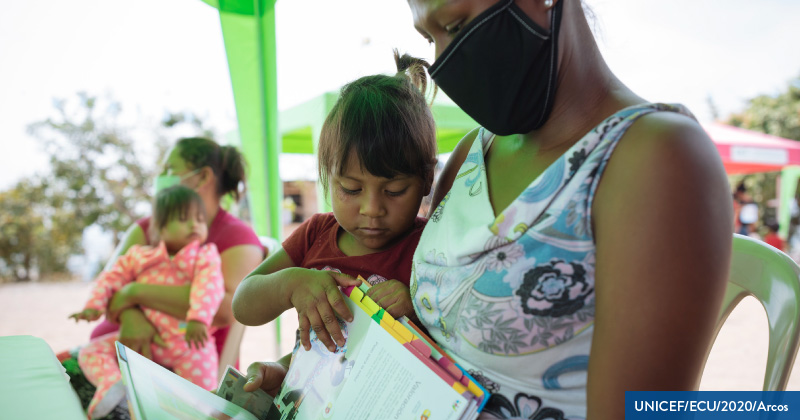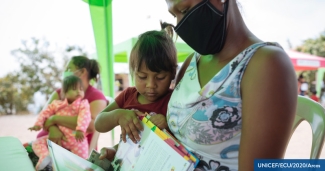COVID-19 and Childcare Efforts for Vulnerable Families

[Editor’s Note: This blog post comes to us from MCN intern Jordana Oman, who is a senior at Salisbury University, working toward a Bachelor’s in Sociology with a minor in Communications. Her career goal is to help underserved communities receive the quality resources and access to health care that they need to live a healthy life.]
For more than a year, “essential” workers have continued to work. Despite an increased risk of exposure to COVID-19 in the workplace, a disproportionate risk of contracting severe COVID-19, economic instability, and fear and anxiety over these concerns, immigrant food and farm workers have toiled through every day of the pandemic on farms and in meatpacking factories in order to supply our nation’s food. The majority of these workers have families to support. COVID-19 has negatively impacted childcare accessibility for these families, but there are ways to improve the balance between labor and childcare.
Lupita Olivares, a Parent Liaison and Coordinator, at Woodson Elementary School in Somerset County, Maryland, works with a variety of vulnerable families, conducting phone calls, acting as a translator and interpreter, and working with school children to keep their families informed on the recent news and actions in the school system. Olivares works with Spanish-speaking families from Mexico and Guatemala, with over 90 percent lacking authorization to work in the United States.
These families work in various industries in the Delmarva Peninsula, where chicken processing, agriculture, and construction industries dominate. However, formal childcare options, particularly during the pandemic, are limited to nonexistent. Older siblings watch the younger ones, or friends of the family watch the children for a low price. There are few resources to help with the cost of childcare, which at $300 weekly per child can be a prohibitive expense for these families. Because of COVID-19, the children had been attending virtual schooling from home. Older children often had to skip class, and began falling behind their peers, in order to watch their siblings while the parents went to work, said Olivares.
Olivares saw this firsthand. She recalled instances when Woodson Elementary would call her, to inform her that one of the children she oversees wasn’t online. She would arrive at the home to check on the children and make sure they could access their classes. As Olivares put it, the children would respond stating, “I have to take care of my little sister,” or “I have to take care of my cousin.”
Throughout the entire pandemic, Olivares’ families received no childcare assistance from agencies. Additionally, Olivares’ families were excluded from almost all COVID-19 supports, such as stimulus checks. By and large, the children of the families are US citizens, yet they are excluded from many resources because the parents lack authorization to live and work in the US. In order to receive financial assistance, taxes must be filed, which requires a Social Security number, which many of the parents lack. Federal childcare assistance was not given to any of Olivares’ families.
Olivares has several recommendations: Stimulus checks must be provided to vulnerable families. Childcare assistance for essential workers should be provided as well, because the parents were deemed essential workers during the pandemic, standing on the frontline of COVID-19, and they were required to work through outbreaks and local case spikes. Once COVID hit, childcare facilities were closed, leaving the parents in a bind. More support must be given to these families to reduce disparities surrounding the coronavirus, Olivares concluded.
Some of Olivares’ families have started the vaccination process, along with the teachers of Woodson Elementary. This week, vaccines have finally become available to the whole community. Though vaccinations are a great step in protecting human lives and providing safety within childcare, other efforts must be implemented to ensure there is access to childcare without documentation and financial worries. An increase in resources, provided in the languages spoken by the local community, will ensure that essential workers can get good information, avoid health misinformation, and have access to services like childcare so they can continue to provide the needed essential service. These essential workers help to contribute to the nation’s food supply. Now we can help them by providing them sufficient childcare, vaccines, and other COVID-19 resources.
President Biden just proposed a $1.8 trillion plan for workers, students and families. Known as the American Families Plan, it aims to expand access to childcare and education. The childcare plan is not universal, compared to the pre-K plan, which will still make it difficult for vulnerable families to access. It is unlikely they will use options such as Early Head Start, as they already had not used the program for support. Under the plan, childcare will be completely covered for low-income families. But because most of Olivares’ families are lacking authorization to live and work in the US, they may still not have access to this resource.
Got some good news to share? Contact us on our social media pages above.
Return to the main blog page or sign up for blog updates here.
- Log in to post comments
